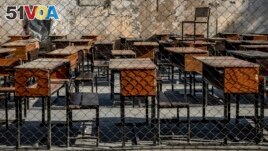20 March 2024
An Afghan education official says the ruling Taliban group might permanently close girls' secondary schools. The official said the Taliban is instead supporting religious schools known as madrasas.
The Taliban shut down girls' secondary schools in 2022. The group gave "religious and cultural" concerns as the reasons.
Taliban officials defend the ban. They say they are working to create a correct educational environment for older female students.

FILE - The benches of a school sit empty in Kabul, Afghanistan, Thursday, Dec. 22, 2022. (AP Photo/Ebrahim Noroozi)
"Schools may never be reopened the way they were under the occupation," an official at Afghanistan's Education Ministry told VOA. The official was referring to 2001 to 2021, when the U.S. military was in the country.
The official said there is no major difference between a traditional school and a madrasa. The official did not wish to be named because the Taliban have banned its members from speaking to VOA. The official added that madrasas serve the purpose of education just as well as traditional schools.
However, the United Nations and human rights workers worry that madrasas cannot fully replace traditional schools. They say madrasas deal too much with religious studies and do not teach enough subjects.
U.N. concerns about madrassas
U.N. Secretary-General Antonio Guterres expressed this worry in a report to the U.N. Security Council this month. He said the madrasas do not prepare boys or girls well enough for higher education and professional training. Students need "higher-level" education and training "to join an effective workforce in the future," he added.
The U.N. reports there are over 7,000 registered madrasas in Afghanistan with about 380 for girls. Taliban officials have said there are no age limits for girls attending the religious schools.
In his report, Guterres noted that employing new teachers for madrasas has continued. In July 2023, the leader of the Taliban ordered the hiring of 100,000 new madrasa teachers by the end of last year, the report said.
Pashtana Dorani is a U.S.-based Afghan women's education activist. She said the Taliban has already replaced traditional schools with religious ones. "They have created their own system," Dorani told VOA.
In addition to closing secondary schools for girls, the Taliban has banned women from most jobs. The group also does not permit women entry to some public places like parks and sport centers.
Last year, the all-male Taliban cabinet banned women's beauty parlors. Taliban officials say their rules agree with what Afghans want for the future.
Last year, education ended for more than 330,000 Afghan girls as they passed grade six exams. Aid agencies said they joined more than 3.7 million girls who are banned from secondary schooling.
Experts worry about the long-term effects of the Taliban's education policies. Afghanistan has one of the highest levels of maternal deaths during childbirth in the world. Experts warn that restricting education will lead to even worse public health problems.
The U.N. children's agency, UNICEF, estimates keeping girls out of schools causes $500 million in economic losses for Afghanistan each year.
The Taliban ruled Afghanistan from 1996 until October 2001. After 20 years of war, they returned to power in August 2021.
I'm Andrew Smith.
Akmal Dawi reported this story for VOA. Andrew Smith adapted it for VOA Learning English.
_
Words in This Story
beauty parlor –n. a business that provides women with services meant to beautify their hair, skin and fingernails












